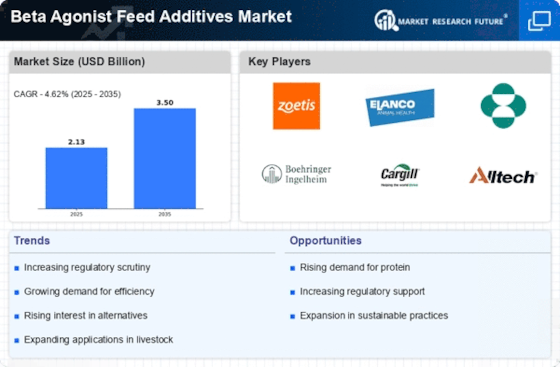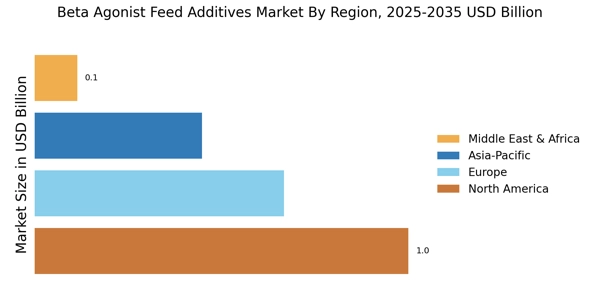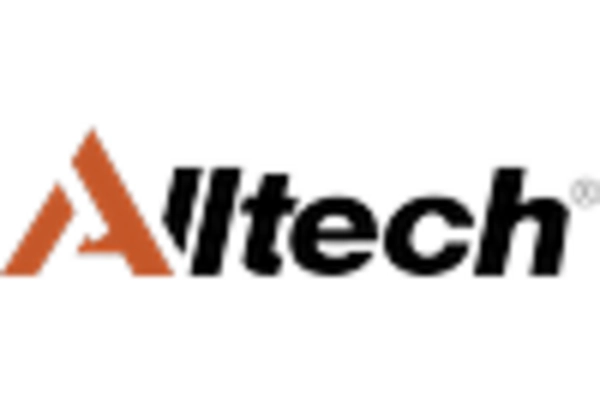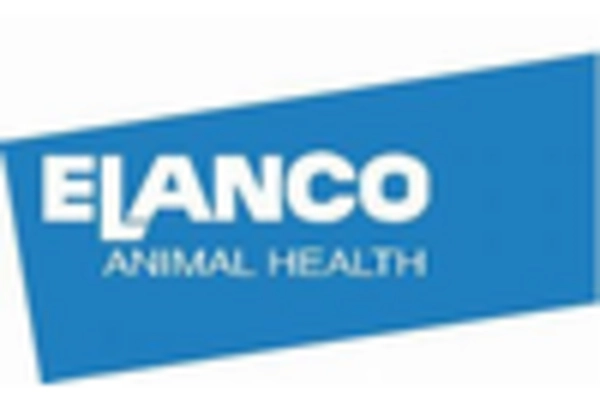Rising Demand for Lean Meat
The increasing consumer preference for lean meat products is a pivotal driver for the beta agonist feed additives Market. As health-conscious consumers seek lower-fat meat options, livestock producers are compelled to enhance feed efficiency and meat quality. Beta agonists, known for their ability to promote muscle growth while reducing fat deposition, are becoming increasingly popular among farmers. According to recent data, the demand for lean meat is projected to grow at a compound annual growth rate of approximately 4% over the next five years. This trend indicates a robust market potential for beta agonist feed additives, as they align with the evolving dietary preferences of consumers.
Consumer Awareness and Health Trends
The growing awareness of health and nutrition among consumers is shaping the Beta Agonist Feed Additives Market. As consumers become more informed about the nutritional content of their food, there is an increasing demand for meat products that are not only lean but also produced sustainably. Beta agonists contribute to the production of healthier meat options, aligning with consumer preferences for quality and health. This trend is supported by market data indicating that consumers are willing to pay a premium for meat products that meet their health standards. Consequently, the demand for beta agonist feed additives is expected to rise as producers adapt to these changing consumer expectations.
Cost Efficiency in Livestock Production
Cost efficiency remains a critical driver in the Beta Agonist Feed Additives Market. Livestock producers are continually seeking ways to optimize production costs while maintaining high-quality outputs. Beta agonists have been shown to improve feed conversion ratios, allowing animals to gain weight more efficiently with less feed. This efficiency translates into lower operational costs for farmers. Market analysis suggests that the adoption of beta agonist feed additives can reduce feed costs by up to 10%, making them an attractive option for producers aiming to enhance profitability. As the pressure to reduce costs intensifies, the market for these additives is likely to expand.
Increasing Regulations on Antibiotic Use
The tightening regulations surrounding antibiotic use in livestock production are propelling the Beta Agonist Feed Additives Market. As concerns over antibiotic resistance grow, many countries are implementing stricter guidelines on antibiotic usage in animal husbandry. Beta agonists present a viable alternative to antibiotics for promoting growth and improving feed efficiency. This shift is likely to drive demand for beta agonist feed additives, as producers seek to comply with regulations while maintaining productivity. Market forecasts indicate that the demand for alternatives to antibiotics, including beta agonists, will continue to rise, further solidifying their role in modern livestock production.
Technological Innovations in Animal Nutrition
Technological advancements in animal nutrition are significantly influencing the Beta Agonist Feed Additives Market. Innovations in feed formulation and delivery systems are enhancing the effectiveness of beta agonists, leading to improved animal performance. Research and development efforts are focused on optimizing the dosage and timing of beta agonist administration, which can maximize growth rates and feed efficiency. Furthermore, the integration of data analytics and precision farming techniques is enabling producers to tailor feed strategies to individual animal needs. This trend towards personalized nutrition is expected to drive the market for beta agonist feed additives, as producers seek to leverage technology for better outcomes.

















